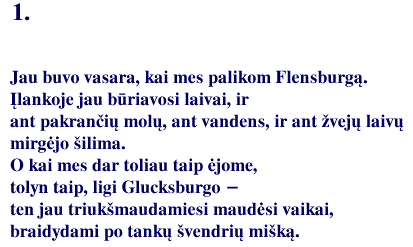1.
It was already summer, when we left Flensburg.
Sailboats filled the bay, and
out on the shoreline piers, over open water and the
 fishing boats
fishing boats
there was a shimmer of heat.
And once we'd made our way
out to Gluecksburg,
the children there were noisily splashing
in a thick-grown forest of reeds.
We felt the pull of distance.
War was just over, with its last
shells, its last bomb blasts
still echoing off the slopes. Past stations in rubble,
and gutted, charred little towns,
we kept moving on, pushing our way in
among women and children,
war prisoners and miserable soldiers
squatted down in muggy heat, slumped together
with the swarms of refugees
on grimy floors, with hunger and thirst
to stretch our hands out toward any well
or cup of water,
and snatch up tiny, under-ripe green apples
gritty and battered off railroad embankments,
or out of ditches below the tracks.
So, slowly, we pushed on that summer, laying in
at every train stop, beside each bridge,
trudging down blackened knolls and
out along narrow fieldpaths,
spending the nights on burned-out platforms
and charred tracks.
You remember. That time we were in Hanover,
sprawled out where the station had burned to the
 ground,
ground,
looking up at the bright nightsky that June,
hearing those heavy wornout ravings,
freightyard hoisting-cranes, the wrenching
sad city noises filled with uncertain steps,
with death and grief:
staring at a pale moonlit night
that felt so worn out, worked over, scorched
and shattered from what not long before had been the
 proud
proud
the core and center of Europe.
With eyelids dropping, the feeling gone
from each nerve-end, we kept on pushing south that
 summer
summer
through heavy rumblings, beyond exhaustion,
and each town, each horizon,
each trainstop along the way
gave off a lingering stench of death and smoke,
now with brokendown, burned-out tanks and fortified
 trenches,
trenches,
highways blown up
and bomb craters midfield -- deep hollows
staring back black death --
the only scrawny vague
surviving witnesses
under the first flowers of spring.
On and on we kept pushing
through towns in rubble, past wrecked horizons
with villages razed, acres of cannon and truck,
whole graveyards of steel,
and squads of an occupying army,
their painted guardrails around town squares glaring
 white.
white.
So we pushed on
and saw people starved down to nothing
come out from under the broken brickwork, in clusters
up from the dust, in vivid stripes of concentration-camp
 inmates,
inmates,
death-like, their hands shrunk to nothing,
the women and children surfacing in swarms.
And the war prisoners. Ringed in by shabby, grimy
 barracks
barracks
they sang in a pale haze under the sun, played cards
while waiting for the last trucks, freedom
bound, to take them home.
There was one young German soldier, still a child,
all of a child standing there
inside the burned-out Hanau station, staring at
the heaped up brick and stone, the skeletal steel,
treetrunk, smokestack and dirt charred the same
 overall black,
overall black,
windows wrenched out of their frames, a meshwork
of iron and steel sagging down --
his childhood in shreds, all that was left of it.
Tears ran like water down his face,
just like water.
We had crossed salt-marshes up north, desolate fields,
black Ruhr Valley skylines,
to push farther south, through dense
midGerman towns. So that
now it was August, maybe only
the end of July -- time went and faded out --
we found ourselves in Würzburg.
It was still morning, yet the air
flared a real summer flame.
All tired out, we stood on a platform
and stared at the stubs of masonry left,
the rolling hills, the gold
summer shimmer:
and felt this sudden urge
to go out in the fields!
It was the pull of summer, the burning Bavarian sky
and sunlight --
and taking what was left of our memories with us,
our pitifew packings for the trip (the towel
mother made us take, a scarf from our sister,
some snapshots now faded), we were
suddenly high up inside the orchards.
Now here we were months later, after all that death,
eyeing orchard slopes, trees,
and villas that hugged the hillsides,
not believing any of it yet,
still full of the road we'd gone, the swarm
of pounding noises.
And yet these apples, ripe and full, were not the charred
green apples from the railroad tracks.
This was Bavaria we were in.
Look, my brother was saying: how green
the fields and trees all around!
As we climbed on up to the top of the orchards
and walked the fields
half crazed, drinking in the smell of wild roses,
the shade of the orchards.
This was life reviving, in every
apple bough and vineslope.
And the people,
the grown girls, women in gaudy summer kerchiefs,
with wicker baskets full, ripe as orchards
alongside the men, making their way down into town.
Dizzy with summer blossoming,
all that vitality, that vineland fragrance,
we sat there on a hillside, looking down
the deep track the stream of the Neckar had carved,
 and out
and out
past the ruins of Würzburg, reflecting
on the years of suffering, death and despair,
and marveled at the life coming back -- each sign we
 saw of it --
saw of it --
and the earth's strength.

